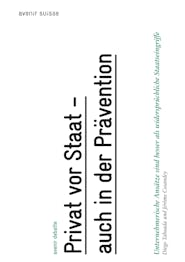What we eat and drink has become increasingly politicized. Under the banner of public and preventive health the authorities are attempting to limit the consumption of food such as processed products containing salt, sugar and fat, and of tobacco and alcohol as well. There’s also a clearly discernible trend abroad: taxes and levies on sweetened beverages, for example, have been introduced in more than forty countries, more than half of them in the last seven years. In Switzerland too, especially in the French-speaking part of the country, there are many initiatives to step up regulation on the cantonal and federal level.
Unhealthy Government Regulation
This new wave of government regulation should be put in question. While it’s true that two-thirds of deaths in Switzerland are down to noncommunicable diseases, the notion of an epidemic of unhealthy lifestyles and consumer patterns among the Swiss population does not apply. Consumption of tobacco, alcohol, and sugar has declined in the last 30 years (down 0.4%, 0.7% and 0.9% respectively). Salt- and fat-rich products such as red meat and dairy are also in decline, despite a slight increase in the consumption of cheese. There has also been a significant increase in the consumption of plant-based oils and fats. So broad-based regulation for all citizens and for all types of food, beverages, and tobacco products isn’t justified.
Three Fields of Action
As empirical analysis has shown, government interventions to limit the consumption of such goods frequently fail to hit the mark. In their publication, Diego Taboada and Jérôme Cosandey compare numerous examples of regulatory and enterprise-driven approaches. The conclude that the role of corporations in solving such problems is underestimated. In matters of public health, the private sector is part of the solution rather than part of the problem. Avenir Suisse recommends three main thrusts to fight noncommunicable diseases:
- A more active role for the private sector in public health matters: Unlike the state, the food industry has the flexibility and knowledge of consumer preferences to act rapidly. Things that work are labels, public commitments, and industry agreements with clearly communicated, measurable targets. Experience with the Milan Declaration, for example, which succeeded in reducing the sugar content of cereals by 13% between 2016 and 2018 by means of modified recipes and products, is encouraging, and points in the right direction.
- No taxes on food: This type of tax is regressive in nature and place a greater burden on low-income households. It’s inefficient, too, because it affects everyone, even people who consume in moderation. Introducing taxes of this sort also involves a lot of red tape when it comes to both defining the products affected and implementing the regulation.
- Eliminating contradictions in government economic and health policy: The federal government funds prevention campaigns and at the same time subsidizes the production and sale of unhealthy products like sugar, salt, oil, cheese, alcohol, and tobacco to the tune of millions of francs. The funding of the government old age insurance scheme also depends on consumption of “sinful” products, with levies on tobacco and hard liquor contributing around CHF 3 billion to the AHV/AVS a year. Instead of extending the government’s fields of action in the struggle with noncommunicable disease, reducing these inconsistencies would be good for the credibility of policy.






